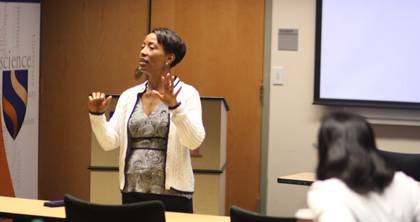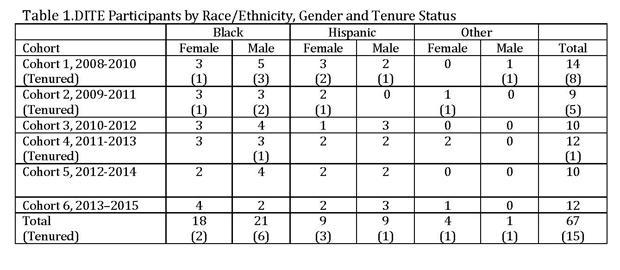Economics Program Mentors Minorities to Maturation
Junior mentoring program at Duke helps minority faculty achieve high success in economics

Omari Swinton, Luisa Blanco Raynal and Salvador Contreras are minority economists persevering in a profession where some say economics is discriminatory.
Duke is helping to turn that around.
Last week, the Research Network on Racial and Ethnic Inequality hosted the 6th cohort of the Diversity Initiative for Tenure in Economics (DITE), a national junior mentoring program that helps professors early in their careers progress on their way to tenure at their schools, particularly in economics.
"This is a discipline that is more discriminatory than the other social sciences," said William "Sandy" Darity, Duke professor of public policy. "I think black and Latino scholars frequently do not get the same type of information about how you negotiate the profession. There probably is a tendency for many of the existing faculty to engage in more informal mentoring for scholars who look like them."
Darity the program's director, and associate director Rhonda Sharpe established DITE in 2008.
Darity said young minority professors face a widespread belief in economics that blacks are not good at math and are not thought of as economists. This makes mentoring even more important for minority economists eager to be thought of as valued members of a community.
"The purpose of DITE is to make sure that if you want to be a faculty member, then you can get that mentoring," Sharpe said. "There's really no need for everybody to learn this trial by fire. Our purpose is to remove the veil of mystery."
Participating DITE mentors have a three-year commitment to their mentees. Duke economic professors such as Thomas Nechyba, Patrick Bayer and Charlie Becker have helped with funding and have served as mentors.
The provost's office, economics department and National Science Foundation have also helped support the program.
According to a 2010 survey in the Scientist and Engineers Statistical Data system, the number of minority tenure professors in economics is significantly lower than their white counterparts. There are 98 minority female non-adjunct professors in economics as opposed to 375 white females and 156 minority male non-adjunct professors in economics as opposed to 2668 white males.
Swinton, Raynal and Contreras are three of the fewer than 300 non-adjunct professors in economics. They were past fellows in DITE and are either tenure-track or have received tenure.
Raynal is a Latina associate professor of public policy at Pepperdine. She said having that mentee-mentor relationship was vital to her success.
"One of my mentors told me you're doing well, but I think you should explore new things or look for something that will help you grow."
Contreras, also Latino, is eligible to become an associate professor at Texas-Pan American in the fall. He also said minorities are at a disadvantage coming out of the Ph.D. program because they don't have a broad network in the profession.
He said the DITE program at Duke helped him.
"I've been able to meet a lot of people that I would have never known existed," Contreras said. "They have been mentors, friends and colleagues."
Swinton, an African American will be an associate professor at Howard University in the fall. Swinton attended graduate school at Duke and followed in his father's footsteps to become an economist.
"It's something that's hard, and a lot of people misinterpret the amount of work you have to put in the profession," Swinton said. "If you didn't have anyone to talk to then you might have struggled. DITE provided that to me."
Below:Table shows number of participants in past DITE programs, with sucessful tenures listed in parenthesis.
